The value of the dollar is falling and that’s no secret. The Fed has maintained that it will keep inflation at an average of 2% “for some time.”
This means that interest rate will be kept at near zero until employment picks up. As a result, the value of our dollar will continue to erode as we enter a period of stagflation.
In this type of environment, saving is just plain silly. After all, when the idea of “high interest rate saving account” is no longer a viable solution, what’s the point of saving anyway?
As a strong advocate for saving money, it makes me sad that I can no longer support this thesis blindly. Instead, I’ll use alternative means to keep my purchasing power afloat.
In this post, we’ll discuss ways to combat a falling dollar and how to best use our money wisely so that our wealth can be preserved.
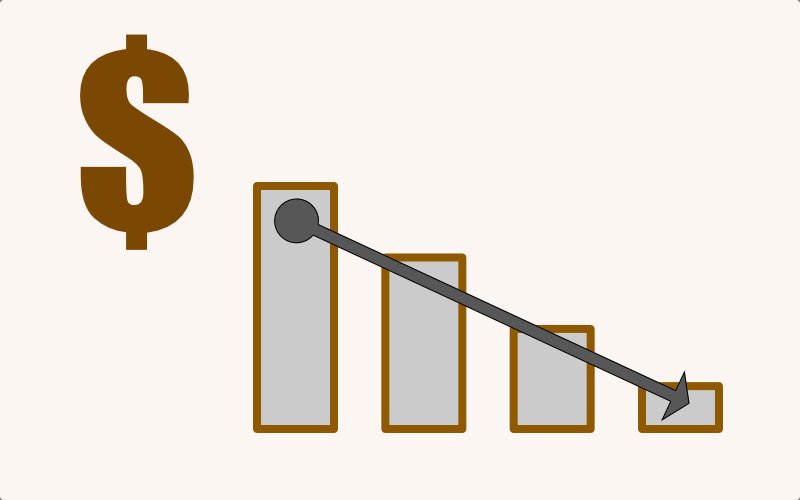
This post may contain affiliate links, which means I may receive a commission, at no extra cost to you, if you make a purchase through a link. Please see my full disclosure for further information.
What to Do When the Dollar Is Falling
The Federal Reserve has implemented a series of monetary policies to combat the recent recession.
Basically, it has injected a large amount of money supply into the economy and kept interest rate artificially low. The hope of doing so is to keep economic activities high despite having record high unemployment.
This has caused the dollar to plummet in recent months. Check out the latest graph of the USD/CHF (US Dollar/Swiss Franc) exchange rate pair below.
Note: USD/CHF is one of the widely traded foreign currencies on the FOREX market.
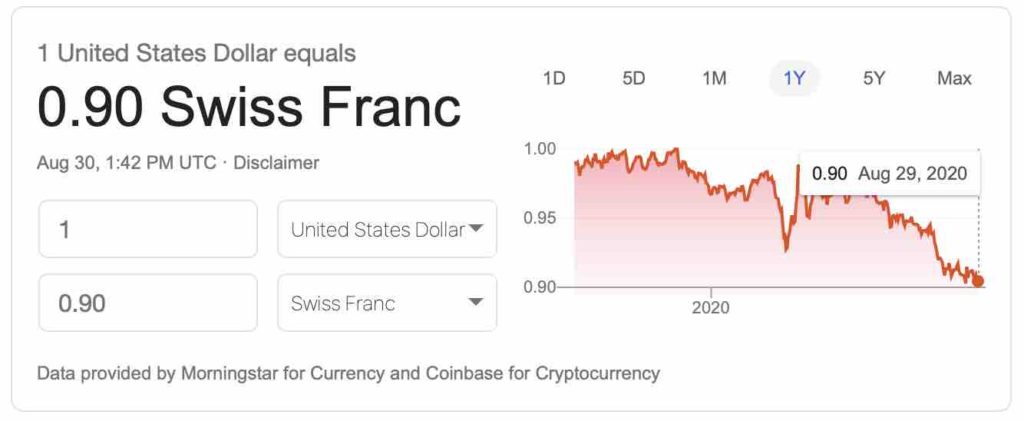
When the dollar is falling, we have less incentive to save money because the value is going down. Traveling will also become more costly as the dollar gives you less in other foreign currencies.
By keeping interest rate low, the Fed is hoping that consumers will spend more in order to ramp up inflation.
While spending is a proven way to stimulate the economy, I don’t think we should spend blindly.
Instead, we should combine a strategy of spending wisely while stocking up excess cash in other areas.
Here are five ways you can consider to combat a declining dollar:
1. Spend Money on “Value”
Just because the dollar is falling, it doesn’t mean that we have to go out and spend incessantly.
But because our dollar is falling, we should spend our money wisely. To do this, you have to give meaning to the word, “value.”
Value, in broad term, is the things that are important, useful or worth a great deal to a person.
We all have our own values like family, adventure, progress, philanthropy, and even living financially independent! When you know what you value, you can spend money wisely.
For example, I value education and growth for my daughter. At times I have considered the possibility of giving her a private school education.
I have gone through the public school system my entire life, and while I turn out alright, I do wonder if there’s truly a competitive edge in a private school system.
I’ve spoken to many parents with varying views. Even though there are pros and cons to each school system, I think it doesn’t hurt to give both a try.
As such, I’m open to the possibility of enrolling my daughter in private school and assess if it’s worth continuing.
Without having first-hand experience, I’m curious to find out the difference, if any.
And since the value of my dollar is eroding, I might as well spend it on where it counts most.
This doesn’t mean that I support the monstrous cost of education. But if I had to spend money on what I value most, I’d say it’s to provide valuable education to the next generation.
However, my peripheral for planning is limited so my spending habits on education might evolve.
Who knows? Maybe I’ll even forgo the idea of traditional schooling altogether and do homeschooling one day!
Finding other things to spend money on has often been notoriously difficult for me since I’ve read the book, Affluenza: The All-Consuming Epidemic.
2. Invest in the Stock Market
Before we proceed, I have to make a disclaimer here. Investments are risky and could lose value, so please take the following as informational purposes only.
Over the years, I have been actively investing in index funds which I believe are the best investment vehicle for everyday investor.
But lately, major index like the S&P 500 has been ballooning like it’s on steroid, ignoring the current state of the economy along the way.
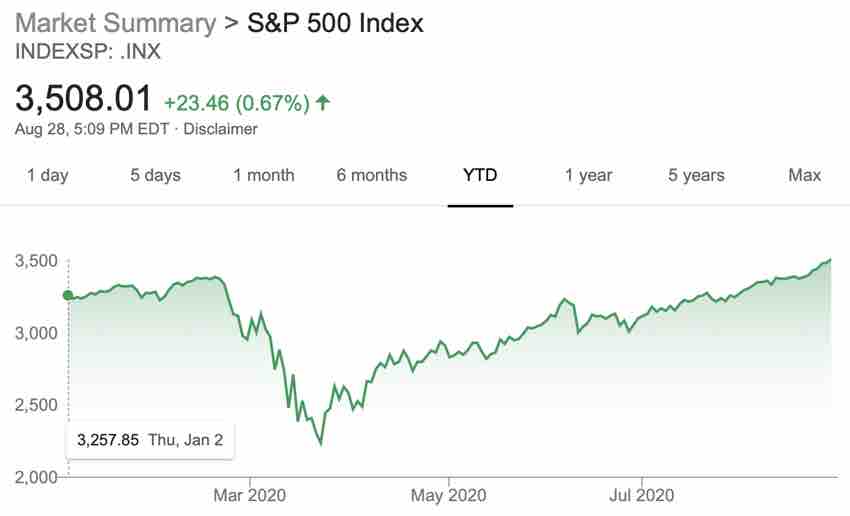
This is, in part, driven by the Fed’s aggressive monetary policy to buy up corporate bonds. These bonds include those of Microsoft, Apple, Goldman Sacks, among others. The purpose of this action is to bolster the “economy” but it has benefited the stock market the most.
As a result, many of the companies in the S&P 500 may have become wildly overvalued.
If you’re a long-term investor, whatever the stock performance is today shouldn’t matter too much. You should still stay the course in your investment strategy and keep on investing.
The reason why I kept investing is because the dollar naturally erodes due to inflation. But since the Fed has announced that it will artificially keep inflation above 2% so that it can average out the low inflation rates of the past, this means that consumer prices are expected to increase while our purchasing power declines.
This is perhaps why the stock market is in its euphoric phase whereby investors are ignoring negative news in the economy in their quest for yields.
Even though investing is an important aspect of growing wealth, it shouldn’t be a priority if you have a large amount of high interest debts.
Therefore, it’s best to evaluate your financial goals before making decisions to take on investment risks.
3. Buy Gold or Invest In a Gold Fund?
Before the Gold Standard was abandoned in 1933 by the U.S. government, gold was used as a form of currency.
Today we use fiat money in the form of the dollar. But as the value of dollar declines, gold tends to move upwards. This is evident by the latest rush to gold by investors. That’s because as the dollar falls, the perceived value of gold rises since it’s thought as a save-haven commodity.
While I believe gold could be a good diversification strategy, I’ve never perceived it as an investment. For the most part, gold is a type of metal that was used as a currency in the past. I, for one, do not believe that we’ll ever revert back to the Gold Standard hence I don’t see the point of investing in it.
However, I’m now open to adding a gold fund into my portfolio purely for diversification purpose. If the fiat money is at risk of a decline in value, then investing in a gold fund could be a good way to hedge against the risk.
So far, I have not bought any gold or gold fund, sauf our wedding rings and a few other gold jewelries.
It remains a question mark whether it’s wise to set aside some capital for this precious medal.
4. Keep a Strong Foreign Currency Reserve
As an expat living in Switzerland, foreign exchange rate is very important to me particularly the USD/CHF pair.
And in the past seven years of living abroad, I have developed a strategy to hold multiple foreign currencies.
Since USD is dropping at a rapid speed, the value of CHF and EUR have increased relative to the dollar. As such, I have been converting a large portion of CHF into USD then investing it.
However, in today’s economy, I no longer feel comfortable investing heavily in such a highly inflated stock market. So for the time being, I’m holding onto more CHF as the Swiss Franc is known to be a safe haven currency.
If you’re not an expat, this may not be a right approach for you since you’ll incur additional exchange rate fees. Nevertheless, FOREX can be an important market to look into especially for those who travel abroad frequently (or planned to anyways).
5. Invest in New Business Ventures
Finally, if you find that general investing in today’s economy is just way too risky, why not invest in yourself instead?
Today, creating an online business is easier and more affordable than ever. You can write an ebook and self-publish online or you can create a course on something you excel at. Both of these mediums could earn you serious bucks!
Related: How to write an e-book for beginners
Other ventures could include starting a blog or a website where you can share ideas or sell products.
Indeed, more and more people are going online to find information and do shopping. That’s why creating a website is a great way to build an online business.
And if you’ve already started a website or a blog, this could be a good time to invest more into the business to scale up.
Some of the things I’ve invested and will continue to invest in are:
- Courses to enhance my knowledge in online marketing such as SEO and Pinterest
- Subscription tool to build an email list
- Graphic design tool to create Pinterest pins
- Paid stock images to enhance visual of the site
- Social media scheduling tool to reduce workload
Even though creating a business is tough in the first few years, I know that it’ll be rewarding once I overcome the beginning stages.
As we can’t control macroeconomic events such as the declining dollar, the one thing we can control is how to allocate our capital and time.
And since I value entrepreneurship, spending on a business venture seems much more logical than buying new things that I don’t need.
Above all, what’s a better way to bolster the economy than to create a thriving business?
Related: A list of tools to build a profitable blog/website

Save this PIN
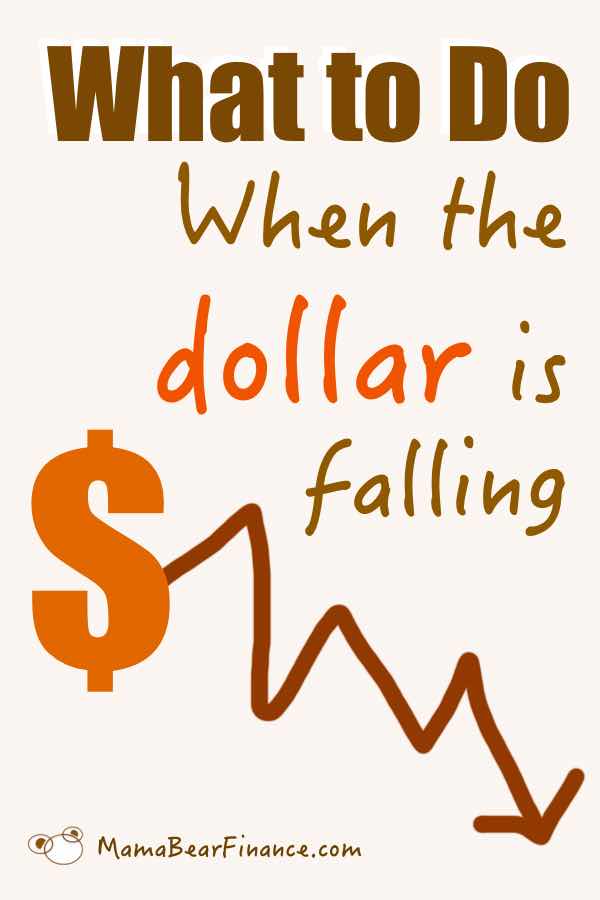
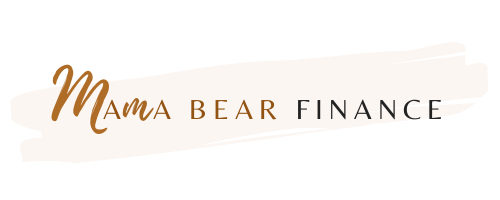
Thanks for the tips about what to do when the dollar is falling. It is hard to always be prepared but best to try!
You’re welcome! Yes, it’s good to be prepared as new events unfold.